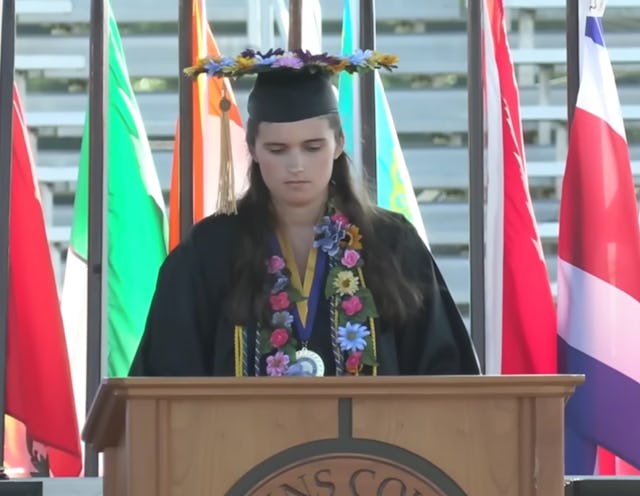A Nonspeaking Valedictorian With Autism Just Gave The Most Moving Speech
2022 Rollins College grad Elizabeth Bonker addressed her classmates with the help of a communication device.

If you have six minutes, listen to this moving speech by Elizabeth Bonker, a 2022 graduate of Rollins College and one of five valedictorians to receive a diploma this year. Bonker, who was unanimously voted by the other four valedictorians to make the commencement speech, is nonspeaking and autistic — and delivered her words with the help of a communication device.
“Today we celebrate our shared achievements," she says at the beginning of her speech. "I know something about shared achievements because I am affected by a form of autism that doesn’t allow me to speak. My neuromotor issues also prevent me from tying my shoes or buttoning a shirt without assistance. I have typed this speech with one finger with a communication partner holding a keyboard. I am one of the lucky few nonspeaking autistics who have been taught to type. That one critical intervention unlocked my mind from its silent cage, enabling me to communicate and to be educated like my hero Helen Keller."
She spoke to a class of 500 people and their families as one of the five people in her class to achieve a perfect 4.0 GPA. Bonkers named and congratulated the other four students in her speech: Emily Curran, Sofia Frasz, Jessika Linnemeyer, and Charles Mellin.
In addition to Helen Keller, Bonker was also inspired by another graduate of her college, Fred Rogers — and she uses him to illustrate the heart of her speech: using your voice for service.
"During my freshman year, I remember hearing a story about our favorite alumnus, Mr. Rogers," she said. "When he died, a handwritten note was found in his wallet. It said, 'Life is for service.' You have probably seen it on the plaque by Strong Hall. Life is for service. So simple, yet so profound."
She both highlighted the volunteerism of her classmates and shared her own story and mission.
“Personally, I have struggled my whole life with not being heard or accepted. A story on the front page of our local newspaper reported how the principal at my high school told a staff member, ‘The r—d can’t be valedictorian,’” she shared. “Yet today, here I stand. Each day I choose to celebrate small victories, and today I celebrate a big victory with you.”
“For me, I have a dream. Yes, just like Martin Luther King Jr., I have a dream: communication for all. There are 31 million nonspeakers with autism in the world who are locked in a silent cage. My life will be dedicated to relieving them from suffering and silence and giving them voices to choose their own way. What is your dream?”
Bonker’s mom, Virginia Breen, said that Elizabeth lost her ability to speak at 15 months — and soon after, she was diagnosed with autism. Breen said she “burst into tears” at the graduation. “It was such a long journey for us; you know, there were times which felt a bit hopeless," she told WESH Channel 2 in Florida. "Parents with children with autism, I hope that what they may take away from Elizabeth's story is that their children are capable and that we need to keep investing in them, advocating for them, believing in them."
"I am not special. All nonspeaking students with autism can be taught to type," Bonker said in the same interview. "That is my mission. We need to change the way the world sees autism. Just because someone cannot speak doesn't mean they can't feel and think."
Her message is so important, and the end of her speech hit hard. She asked her classmates to write “life is service” on a piece of their commencement programs and keep it with them.
"God gave you a voice. Use it. And no, the irony of a nonspeaking autistic encouraging you to use your voice is not lost on me,” she said with humor. “Because if you can see the worth in me, then you can see the worth in everyone you meet."
After graduation, Bonker plans to expand her nonprofit, Communication 4 All, which strives to make communication accessible for the estimated 40% of people with autism who are nonverbal or minimally verbal.
A note: We generally use “person-first” language here at Scary Mommy (i.e., a child with autism) but are aware a significant number of people prefer identity-first language (i.e., autistic person). We also default to the preferences of the individual person we are writing about — in this case, she uses both interchangeably.